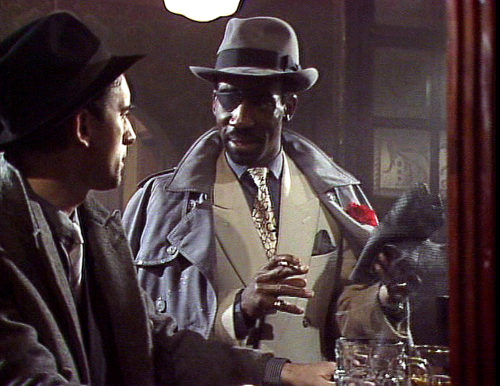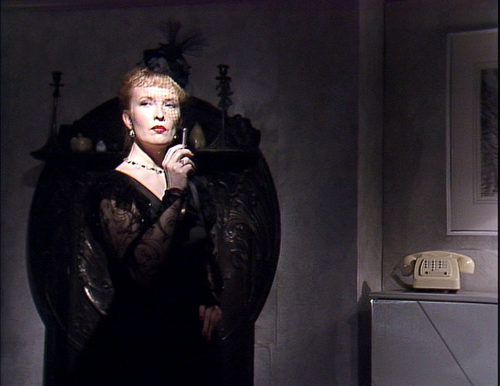Dead Head is a slightly infamous four episode mini-series that aired on the BBC in 1986. It was rather controversial at the time (likely for a number of reasons, including the confusing plot, the full frontal male and female nudity, the torture scenes, and well everything else) and aired only once before its release on DVD in 2013. It’s well known amongst Lawson fans as the source of several thirst gifs, including the ones of him in the bath tub and in the fourties’ bomber jacket.
It has a tendency to turn up on people’s recommendation lists for Lawson stuff because of said thirst reasons, as well as it being a show that features him heavily (he’s in every scene), but I warn you: the plot makes no sense. This is largely intentional.
Content warning: look, they give this thing a 15, but that doesn’t really describe quite what the hell is going on here. Violence, sex, and just. There’s a lot okay.
About
The first episode of Dead Head, ‘Why Me?’, aired on the 15th January 1986 on BBC Two. Made in-house at the BBC by Pebble Mill, it was written by Howard Brenton, directed by Rob Walker, and produced by Robin Midgeley. This episode stars Denis Lawson as ‘Eddie Cass’, Lindsay Duncan as ‘Dana Cass’, Simon Callow as ‘Hugo Silver’, George Baker as ‘Eldridge’ and Norman Beaton as ‘Caractacus’.
This is the first of two things Lawson and Duncan were in in 1986; they’d later star together in the second season of the Kit Curran show, where they still play love interests—of a kind—but the dynamic is very different.
Availability: Out on DVD in the UK since 2013. Howard Brenton did a commentary for the first two episodes which serves to illuminate just how it ended up so bizarre.
Both Howard Brenton and Rob Walker are primarily known for their theatre work—in fact, Rob Walker directed Lawson in Pal Joey (1980)—and actually, this entire series makes more sense if you start to consider it less as a TV series and more as four mini interlinked plays. They set out to do something different, show that television could be made a different way. Whatever your feelings on this series are, it was not a popular take. Walker never did any TV work again, and it was 16 years before Brenton wrote on another TV serial. The entire series was written in about ten days mid-1985, which explains some of the less than well thought out plot—Brenton has admitted he would rewrite elements of the show now.
Why Me?
Eddie Cass is a slightly down-on-his luck guy attempting to make his way in South London. Don’t be feeling sorry for him; he largely seems to be doing this by running a protection racket, and threatening local shop owners, along with some petty theft. Despite his very working class upbringings, Eddie is a patriot, loyal to Queen and Country—he loves the Royals particularly—and votes Tory. Truly, the eighties were a strange place.
A mysterious figure—Stoker—enters Eddie’s local pub. He offers Eddie a job that will change Eddie’s life forever. A simple collection and delivery job that Eddie will receive £500 for. Eddie takes it, collecting the package from a woman in a dingy London flat and taking it to the house in Regent’s Park. Only problem? No one appears to be home when he tries to deliver it.
Left with the parcel—which Eddie was expressly told not to investigate—and down £400 of his fee, Eddie decides to dispose of the parcel under Vauxhall bridge. But he lets his curiosity get the better of him, and opens the box. Inside is a woman’s head. In a hat box. He tosses the thing in the river, hoping that it will get lost in the Thames.
He returns home to the place he shares with Caractacus. Eddie is trying to find some sense in what has happened to him that night, but there is none. Just as Caracacus is attempting to knock some sense into Eddie, the police arrive to raid the place. They’re clearly prepared to lie about what they found, and beat Caractacus up. They split the three of them in the flat up. Eddie realises that they aren’t normal police officers at all.
They show him a photograph of the head in the box. They know what he’s been doing. They have everything prepared to pin the entire thing on him if he speaks a word about it to anyone. Eddie is given £1000 and a bottle of Glen Morangie to pay him for his silence.
When Eddie returns to Caracatacus’s, it’s full of people. In fact, everywhere he revisits is different. The flat he collected the package from is boarded up. The house in Regent’s Park now has a policeman posted outside it. In lieu of anything else, Eddie stumbles around London drinking the scotch, probably hoping that the world starts making sense again eventually.
Eddie realises he’s ended up at his ex-wife’s flat. And that his ex-wife is supposedly involved with everything that went down. Dana is not please to see him, and clearly now belongs to an entirely separate class of folk than Eddie; she’s moved up in the world.
In Dana’s bath-tub, Eddie discovers a number for male grooming products that are not his. Dana clearly has someone who stays over regularly. Despite Dana’s clear displeasure with him, she still lets him back into her bed that evening.
When he wakes up, he discovers Dana on the phone, and dashes straight out of bed (naked) to hang up. Eddie has twenty minutes to leave. Scouring her flat before he does so, Eddie discovers a hatbox hidden away. There’s no head in this one, but the hatbox Eddie dumped into the river was clearly Dana’s; she’s more wrapped up in this than he thought.
Eddie is still trying to make some sense of it. Nothing adds up. Dana moves out of her flat and he can’t find her. Eddie begins to pull himself together, and puts his life back together. Then, one day, in Paddington station, he discovers that the girl’s head has been found in the Thames.
Eddie’s quiet life is quiet no longer.
Verdict
I’ll take a moment first to talk about the credits sequences, both of which are truly bizarre and highly appropriate to the series. The first features ominous music and this really rather creepy puppet of Eddie Cass, complete with hat and British flag. What was it with the eighties and puppets? The end credits feature a weird synth rendition of ‘pussy cat pussy cat where have you been?’—yes, the children’s nursery rhyme. They both succeed in being unsettling and setting the entire mood for the series.
The series is structured slightly oddly, with each episode having a slightly different style & a different set of focus characters. This, the opener, goes full on noir, exploring Eddie’s past and how it led him to this strange turn of events. Answers are lacking. Eddie’s narrative voice-over, from after the fact, does not serve to illuminate the audience much. Though Eddie’s South London is one Brenton knows well—Brenton and his wife used to live in the same building that he places Dana’s flat in—there’s a mythical quality to it too. It’s very of its place and of its time, which makes it odd viewing in the present, thirty years on. The world does not work like this any longer, and as someone who wasn’t alive in 1986, honestly, I don’t know if it ever worked quite this way.
Dana and Eddie’s relationship is adversarial, at best. He clearly never treated her well, so her distaste for him has been well-earned. Never the less, she seems to have a (very small) soft spot for him, indulging him in little moments just for one night. And whilst she’s clearly connected to the people who set Eddie up, does she have any responsibility for it? Who knows.
Lawson is well cast in this. It’s a difficult part to play. Eddie is not a nice character, but the audience has to have some empathy for him—we have to want him to get answers at the very least. Lawson has the acting skills of a leading man, but can also play an everyman. His slightness of figure (and Lawson has always been lithe and small but it’s really on display here) adds to the effect; he could easily be hauled off by any of the spooks, powerless to fight back. I’m not particularly fond of the accent he does in this, but it’s definitely very London—not a hint of Scottish in it. He takes every new situation in his stride. His theatre background—and past relationship with Walker and Brenton—definitely help him carry this piece.
There’s a very cute scene where Eddie is shaving and singing ‘All you need is love’ under his breath. Those following this blog will know I always appreciate the chance to hear Lawson sing. I’m not sure if it was in the script or not, but the director certainly knows Lawson can sing (having previously directed him in a musical) and so it’s nice to see them use it, however it came about.
I still, truly, do not know what to make of the soft-porn esque sex scene in this episode, shot largely from above, through a purple haze, and film layered on top of each other. It exists. There’s a lot of nudity in this series in general, but this is Lawson’s episode to shine as far as that’s concerned.
All in all; if you like alternative TV and thriller noirs and political intrigue, you’ll probably enjoy this. You’ll also get a fair bit out of it if you like Denis Lawson. He ends up in the bath (only once this episode, but it happens again), is in various states of dress and undress, threatens people, is vulnerable, and does a whole host of other stuff. I wouldn’t recommend it without qualifying that the plot doesn’t make any sense, but … there’s a lot to be here for that isn’t the plot.
Next time
Eddie flees to the countryside, only to encounter the very men he’s running from. Luckily for him, one of them is looking to defect. Both of them go looking for answers, which seem perilously thin on the ground. Will Eddie regret his liaison with Britain’s ruling elite? All that and more in Dead Head: Anything for England







